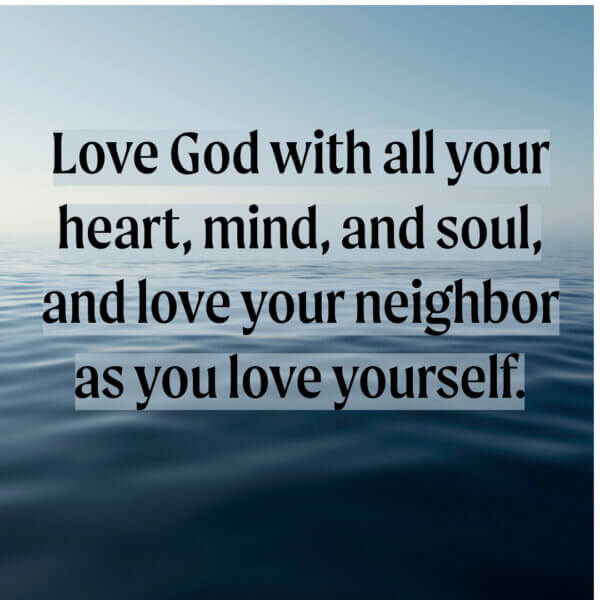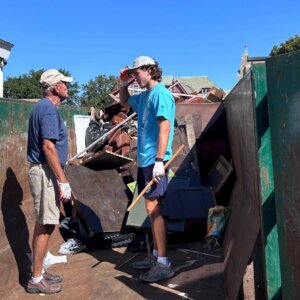
The Involvement Fair
 Does the church feel somehow lighter to you this morning— kind of…cleared out? With thanks to Val Martin and Jim Kaull for organizing, and arranging for the delivery of a 3-ton dumpster, and with the help of Randy, Liz McCarthy, Ed Gosling, Catherine Curtis, Dave Monroe, Nellie Horvath, Derek Martin and 25 or more members of the Salve football team for muscle, this winning team carried out lumber, old folding chairs, retired kneelers, and other assorted items accumulated over Emmanuel’s 122–year history, most of it, I’m convinced, from the first half of the last century.
Does the church feel somehow lighter to you this morning— kind of…cleared out? With thanks to Val Martin and Jim Kaull for organizing, and arranging for the delivery of a 3-ton dumpster, and with the help of Randy, Liz McCarthy, Ed Gosling, Catherine Curtis, Dave Monroe, Nellie Horvath, Derek Martin and 25 or more members of the Salve football team for muscle, this winning team carried out lumber, old folding chairs, retired kneelers, and other assorted items accumulated over Emmanuel’s 122–year history, most of it, I’m convinced, from the first half of the last century.
Friday evening, Jere, Randy, and I went to Salve’s Involvement Fair. I wanted to thank the football players who spent Salve’s Volunteer Day at Emmanuel the day after Labor Day. Also, because really, what’s not to love about an event called an Involvement Fair, where student groups set up tables all over the lawn inviting others to join them in special interests, from a cappella groups to an investment club, a chemistry club, a pre-law and LSAT prep club, a yoga club, a running club, and the award-winning Salve-thon group, which holds fundraising events to help those struggling with uncovered medical expenses.
Maybe you won’t be surprised to learn that I signed up for the University Chorus and also made a great connection with the Marketing Club, an organization focused on web site design, in the hopes they can help us with ours. I love the sense of discovery at the Involvement Fair. People from different places, backgrounds, genders, ethnicities, faiths, and races, come together to discover what they have in common. Except for their roughly uniform age span (most are 17-22), these new students couldn’t be more different. But when they start talking — and listening — to each other through their different contexts, experiences, and backgrounds, they learn how much they share. They can see that they are better and stronger for their differences, which represent a variety of skills and experience to make the world better for everyone. The challenge is listening and communicating with each other — recognizing that other cultures or regions might use familiar words in a different way. It means suspending judgment to listen, staying curious and ready to understand how someone else’s background and experience could lead her to different priorities, or sensitivity to an issue that others haven’t experienced personally. It means really being present with others, always ready to learn something new or change our minds.
Keep the Conversation Going
 I’ve had this kind of open-hearted, open-minded conversation on my mind as we approach our general election in November. Now stay with me here — I’m not going to talk politics. This is a safe environment, and what’s most important is that we stay in relationship and keep the conversation going. But I do think that our community at Emmanuel is just the right place to train up for difficult and important conversations. Communities of faith have a scriptural foundation, which sets forth the Great Commandments as the underpinning for all of our conversations: love God with all our heart, mind, and strength, and love our neighbors as ourselves. The Great Commandments are the basis of civil discourse, but we can’t count on that same commitment say, at dinner with friends, family events, yoga class, at the club, with our running group, or wherever it is we hang out when we’re not in church. There are exceptions, of course, in both directions — that is, yoga classes that hold fast to their spiritual origin and become respectful civil discussion groups, and also communities of faith that steadfastly avoid encountering difference with curiosity engaged and judgment suspended.
I’ve had this kind of open-hearted, open-minded conversation on my mind as we approach our general election in November. Now stay with me here — I’m not going to talk politics. This is a safe environment, and what’s most important is that we stay in relationship and keep the conversation going. But I do think that our community at Emmanuel is just the right place to train up for difficult and important conversations. Communities of faith have a scriptural foundation, which sets forth the Great Commandments as the underpinning for all of our conversations: love God with all our heart, mind, and strength, and love our neighbors as ourselves. The Great Commandments are the basis of civil discourse, but we can’t count on that same commitment say, at dinner with friends, family events, yoga class, at the club, with our running group, or wherever it is we hang out when we’re not in church. There are exceptions, of course, in both directions — that is, yoga classes that hold fast to their spiritual origin and become respectful civil discussion groups, and also communities of faith that steadfastly avoid encountering difference with curiosity engaged and judgment suspended.
Because of that foundational commitment to mutual care and respect, church really matters, not only to our physical, psychological, and emotional well being in our contemporary pandemic of loneliness, but also as a workshop — a forum — where we can engage in the practices of God. Practicing God means connecting first with each other’s humanity, discovering in delight how much we’re alike and rejoicing in the broad portfolio of skills and know how represented by our differences.
I told you I’m not going to talk about politics, but I want us all to think about it. We have to find a way to engage with people who don’t think like we do. If we find ourselves shaking our heads, saying I can’t understand why he thinks that way, or I don’t get why she does that, we can be pretty sure that he and she are shaking their heads about us too. If we can’t find a way to have meaningful conversations through difference, we end up talking to ourselves. We dig deeper into our own trenches and close the doors on our echo chambers, speaking only with those who already agree with us.
Discovering the Other’s Humanity
 Discovering the other’s humanity through difference is what Jesus’ conversation with the Syrophoenician woman in Mark’s gospel is all about. Listening in more than 2000 years later, we have to push through our contemporary understandings of difference to perceive the understanding and mutual respect that Jesus and the woman establish in this conversation. If we don’t dig deep for context, we risk misunderstanding. What we see on the surface is a terrified mother from another ethnic group— begging a man with power to save her daughter from a demon, which is how many emotional and behavioral illnesses would have been described in the first century. Jesus, clear on his mission from God, says, Let the children be fed first, for it is not fair to take the children’s food and throw it to the dogs. Wow. To us today, that sounds harsh — maybe even an unforgivable ethnic slur, but that’s not how Jesus and the Syrophoenician woman respond to each other here. They suspend judgment, connecting with each other’s humanity, each appreciating the other’s context and needs.
Discovering the other’s humanity through difference is what Jesus’ conversation with the Syrophoenician woman in Mark’s gospel is all about. Listening in more than 2000 years later, we have to push through our contemporary understandings of difference to perceive the understanding and mutual respect that Jesus and the woman establish in this conversation. If we don’t dig deep for context, we risk misunderstanding. What we see on the surface is a terrified mother from another ethnic group— begging a man with power to save her daughter from a demon, which is how many emotional and behavioral illnesses would have been described in the first century. Jesus, clear on his mission from God, says, Let the children be fed first, for it is not fair to take the children’s food and throw it to the dogs. Wow. To us today, that sounds harsh — maybe even an unforgivable ethnic slur, but that’s not how Jesus and the Syrophoenician woman respond to each other here. They suspend judgment, connecting with each other’s humanity, each appreciating the other’s context and needs.
While the gender dynamic may tip in Jesus’ favor, the woman is from urban Tyre in Lebanon, and would have actually had considerable wealth and social standing in her context. Especially compared to Jesus’ social location in the poor rural Galilee, she would not necessarily have been marginalized or oppressed. Instead of claiming her privilege, she makes space in her heart for the children of Israel. As Berkeley Dean Andrew McGowan writes, Ancient cities were parasitic to their rural hinterlands, so the Syrophoenician woman’s relative comfort would have come at the expense of the poor people Jesus served in rural Galilee. The Syrophoenician woman gets that, immediately agreeing to Jesus’ priorities, just as Jesus hears and honors her humanity and need by then casting the demon out of her daughter. Communications “static” goes quiet when we hold space for the other’s humanity, and our hearts open wide. It’s a tall order, but that’s how the world is changed, and that won’t happen until we find a way to talk, and listen, together about it. Amen
